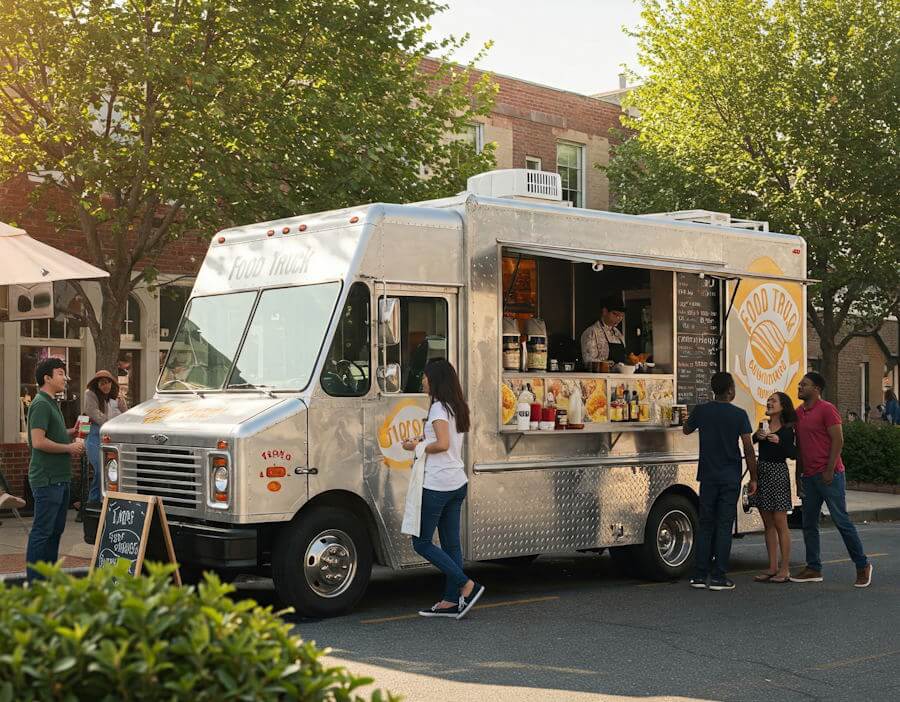Introduction to Food Truck Business
The food truck industry has experienced significant growth and popularity over the past decade, transforming the way culinary entrepreneurs approach the restaurant business. This evolution is primarily fueled by changing consumer preferences, which increasingly favor mobile dining options. Food trucks offer a unique opportunity for chefs and food enthusiasts to bring their culinary creations directly to the customer, providing a convenient dining experience that is often more affordable and diverse than traditional restaurants.
A major advantage of launching a food truck business is the considerably lower startup costs compared to opening a brick-and-mortar establishment. The cost associated with leasing commercial space, renovating interior layouts, and managing utilities can be prohibitively high for many aspiring restaurateurs. In contrast, food trucks provide a more cost-effective alternative, with expenses related primarily to the truck purchase, equipment, permits, and licensing. This capital efficiency allows newcomers to enter the industry with less financial burden, increasing the accessibility of the food service sector.
Moreover, the flexibility inherent in the food truck model allows entrepreneurs to reach a diverse customer base across various locations. Food trucks can quickly adapt their service areas to tap into potential high-traffic events, festivals, or popular gathering spots. This adaptability is complemented by menu versatility, as operators can experiment with diverse culinary offerings, catering to the specific tastes of their clientele. By capitalizing on popular food trends and seasonal ingredients, food trucks can maintain relevance in a competitive marketplace.
However, while the prospects are promising, aspiring food truck operators must understand that securing adequate financing is crucial to the successful establishment and growth of their business. Financial resources are necessary not only to acquire the mobile unit but also to cover initial operating expenses and marketing efforts. With appropriate funding, potential food truck owners can realize their vision and contribute to the vibrant culinary landscape of the food truck industry.
Understanding Your Funding Needs
Starting a food truck is an exciting venture that requires careful financial planning. To achieve success, aspiring food truck owners must first grasp the various costs associated with the business. These expenses can be broadly categorized into fixed and variable costs, each playing a critical role in determining the overall funding needs.
Fixed costs are expenditures that remain constant regardless of the operation level. For food truck owners, the most significant fixed cost is the purchase of the food truck itself. This investment not only includes the truck’s price but also modifications necessary for food preparation and service. Additionally, permits and licenses required by local authorities to operate legally contribute to the overall fixed costs. These permits vary by location, and it is essential to research the specific requirements in your area to avoid unexpected expenses.
On the other hand, variable costs fluctuate with the business’s operational activities. One of the prominent variable costs is food inventory, which entails purchasing ingredients based on menu items. Since menu offerings can change based on seasonality and customer preference, having a flexible approach to inventory management is vital. Labor costs also fall under this category, where expenses will vary depending on whether the owner runs the truck solo or hires additional staff. Understanding these labor needs is crucial, especially during peak hours when customer demand surges.
In summary, comprehensively assessing both fixed and variable costs will provide aspiring food truck owners with the clarity needed to formulate a realistic budget. Identifying these funding needs is the first step towards acquiring the necessary financing, allowing you to bring your mobile culinary dreams to life.
Personal Savings and Bootstrapping
Financing a food truck can be approached in various ways, with personal savings and bootstrapping emerging as popular options for aspiring entrepreneurs. Utilizing personal savings allows individuals to avoid debt and retain full ownership of their venture, thus maintaining financial independence. This approach can foster a strong sense of commitment and motivation, as the entrepreneur has a personal stake in the success of the business.
Bootstrapping typically involves starting and growing the food truck business using existing resources without seeking external financial help. This may include using savings accounts, selling personal assets, or leveraging additional income streams. The principal benefit of this financing option is the preservation of control, as owners are not beholden to investors or lenders, which often come with repayment obligations or equity dilution.
However, relying solely on personal savings and bootstrapping comes with its share of risks. The most significant danger is the potential depletion of personal finances, which can lead to stress and financial instability. Entrepreneurs must be careful not to jeopardize their personal financial security while pursuing their food truck dream. It is advisable to set a budget, establishing clear goals for both the business and personal savings. This promotes disciplined spending and helps mitigate the risk of overspending during the initial stages of launching a food truck.
Effective budgeting involves tracking all business-related expenses, from ingredient costs to maintenance, and setting aside funds for unexpected contingencies. Moreover, adopting savvy saving strategies, such as prioritizing essential purchases and reducing discretionary spending, can bolster personal savings and ensure adequate financial support as the food truck business evolves. Ultimately, the choice to use personal savings and bootstrap should be approached with careful planning and a comprehensive understanding of one’s financial limits.
Traditional Financing Options: Loans and Lines of Credit
For aspiring food truck entrepreneurs, traditional financing options play a crucial role in bringing their mobile culinary dreams to life. Among the most common routes available are bank loans and lines of credit. These options allow food truck owners to secure necessary capital, facilitating the purchase of equipment, permits, and inventory needed to operate a successful business.
Approaching banks for a loan requires careful preparation. Generally, applicants should prepare extensive documentation, including a detailed business plan, financial projections, personal credit history, and proof of collateral. A clear demonstration of how the funds will be utilized can significantly bolster a loan proposal. Ensuring that your financial projections are realistic and grounded in market research can enhance your credibility with lenders.
Improving your chances of loan approval involves maintaining a good credit score, which reflects your ability to manage debts responsibly. Prospective borrowers should assess their credit report for errors and address any liabilities that may negatively impact their creditworthiness. Building a solid personal and business credit history can be advantageous, as lenders often consider both when evaluating an application.
While conventional banks are a prominent source of funding, credit unions offer an alternative that may be more accessible for some entrepreneurs. Many credit unions provide favorable interest rates and personalized services tailored to small businesses. Similarly, small business loans are available through government programs, like the Small Business Administration (SBA), which aims to support entrepreneurs through proffered loan guarantees, making it easier to secure funding.
By exploring these traditional financing avenues, food truck operators can lay a solid foundation for their business endeavors, empowering them to navigate the marketplace effectively and sustainably.
Alternative Financing Methods: Crowdfunding and Investors
In recent years, the food truck industry has witnessed a surge in alternative financing methods, particularly through crowdfunding platforms and attracting investors. These options present aspiring food truck owners with unique pathways to secure the necessary capital while fostering community engagement. Crowdfunding has emerged as a lucrative avenue for many entrepreneurs seeking to showcase their culinary ideas and gain support from potential customers even before the truck hits the road.
Platform-based crowdfunding allows individuals to create campaigns that communicate their vision and offer rewards to backers, such as discounts or exclusive menu items. Successful examples of food truck crowdfunding campaigns often emphasize a strong, relatable story that resonates with prospective investors, showcasing the personal journey behind the business. For instance, food trucks that highlight local ingredients or community-centered missions often attract a dedicated following, enabling them to reach and exceed their funding goals.
Creating a compelling pitch is crucial in the crowdfunding process. An effective pitch should succinctly convey the concept, mission, and unique selling propositions of the food truck while including vivid imagery and engaging video content to enthrall potential backers. Clear financial goals and reward structures are also essential, ensuring that backers understand what they are investing in and how their support will impact the business. Furthermore, garnering community engagement can vastly improve crowdfunding outcomes; actively involving local residents through social media campaigns can create a sense of ownership and investment in the food truck’s success.
Attracting external investors is another viable funding option, often requiring a more formal approach. Here, food truck owners should seek out individuals or groups who are passionate about the food industry and align with their vision. Networking within community events, culinary festivals, or industry gatherings can provide opportunities to connect with potential investors, making it essential for aspiring owners to be prepared with a well-rounded business plan to present. In conclusion, both crowdfunding and attracting investors can serve as effective alternative financing methods for food truck entrepreneurs, making it possible to fund their culinary dreams on wheels.
Grants and Competitions for Food Entrepreneurs
For aspiring food truck operators, securing financing is often a critical component in transforming their culinary vision into a successful business. One viable avenue for obtaining funds is through grants and competitions specifically designed for food entrepreneurs. These funding opportunities not only provide financial assistance but also enhance networking possibilities and mentorship prospects.
To embark on the quest for grants, it is essential to conduct meticulous research. Various organizations, ranging from government agencies to private foundations, offer grants tailored to food businesses. A good starting point is to check state or local government websites, which frequently list available grants for small businesses in the food sector. Additionally, organizations such as the Food and Drug Administration (FDA) and the U.S. Small Business Administration (SBA) often provide information about grants applicable to food entrepreneurs. Consider subscribing to newsletters and joining relevant online forums to keep updated on new funding opportunities.
When applying for grants, applicants must pay close attention to specific eligibility criteria. Many grants require a well-structured business plan that outlines the food truck’s concept, target market, and financial projections. Moreover, applicants may need to demonstrate how their business aligns with the goals of the funding organization, such as promoting healthy eating or supporting sustainable practices.
Competitions also present a compelling opportunity for food entrepreneurs seeking funds. Numerous culinary contests offer cash prizes or investment opportunities to winners. Programs like the Pitch Competition for Food Startups and local incubators can provide platforms for budding food truck owners to showcase their ideas. Success stories abound, with many previous participants launching lucrative ventures following their competitions, thus inspiring others to explore similar paths. These grants and competitions not only summon financial backing but foster a sense of community, innovation, and encouragement in the vibrant food truck industry.
Building a Strong Business Plan
Crafting a comprehensive business plan is a critical step for anyone seeking to secure funding for a food truck venture. This document serves not only as a roadmap for the business but also as a persuasive tool for investors and lenders. A well-prepared business plan communicates the potential of your food truck concept while highlighting your commitment and planning capabilities.
One of the key components of a business plan is conducting a thorough market analysis. This section should outline the target demographic, identify customer preferences, and assess trends in the food truck industry. By comprehensively understanding the market landscape, you can tailor your offerings to meet specific consumer needs, thus increasing your chances of success. Additionally, including information on your unique selling proposition can set you apart from competitors, further enhancing your appeal to potential financiers.
Moreover, analyzing competition forms an integral part of your business plan. This analysis should detail both direct competitors and indirect ones, along with their strengths and weaknesses. Recognizing how your food truck differs from existing establishments is vital in crafting effective marketing strategies and positioning your brand within the industry.
Your marketing strategy outlines how you intend to reach your target audience and drive sales. Detailing advertising channels, promotional tactics, and customer engagement strategies can assure investors of your approach to building a loyal customer base. In addition, it’s important to include financial projections that demonstrate expected revenue, expenses, and profitability. These projections should be based on realistic assumptions and industry standards, instilling confidence in potential backers regarding the viability of your business plan.
In summary, a strong business plan is essential for food truck financing. It not only provides direction for your operations but also serves to attract potential investors by showcasing your knowledge of the market, competition, and sound financial planning.
Navigating Legal and Regulatory Requirements
Operating a food truck involves meeting a variety of legal and regulatory requirements that can significantly influence your business operations, funding options, and overall costs. Understanding these regulations is essential for ensuring compliance and minimizing potential legal complications. The process begins with securing the necessary licenses and permits, which can vary widely depending on your location.
First and foremost, you must obtain a business license and a food service permit. The type of permits needed often varies by city or state, so it is crucial to check the specific requirements in your area. In many jurisdictions, a health department permit is also necessary to ensure that food safety standards are met. This involves adhering to regulations related to food handling, storage, and preparation.
Another important aspect of compliance involves zoning laws. Some areas have restrictions on where food trucks can operate, requiring you to obtain additional zoning permits. It is advisable to research local ordinances that dictate where food trucks can park and serve customers. These regulations help maintain order in urban spaces while ensuring public safety.
Moreover, staying compliant with health regulations involves passing inspections from local health departments. It’s beneficial to familiarize yourself with these health codes and potentially undergo training in food safety. Resources such as the Food & Drug Administration (FDA) and local health department websites can offer valuable information and checklists to guide you through the process.
Additionally, obtaining insurance coverage is crucial for safeguarding your food truck business against liability claims. Consult with an insurance professional to explore suitable coverage options, including general liability, vehicle, and property insurance.
Lastly, resources such as local small business associations, chambers of commerce, and industry-specific organizations can provide further assistance in navigating the intricacies of food truck regulations. Engaging with these resources can streamline the compliance process, enabling you to focus on running a successful food truck operation.
Conclusion: Realizing Your Dream on Wheels
In summation, embarking on the journey of launching a food truck business not only requires passion and culinary skills but also a solid understanding of financing options available in the market. Throughout this blog post, we have explored a variety of avenues that aspiring food truck owners can pursue to secure the necessary funds to turn their dreams into reality. From traditional bank loans and microloans to crowdfunding and grants, each financing option provides unique benefits that can help offset the costs associated with starting a mobile food business.
As readers reflect on the information provided, it is essential to remember that every financing choice comes with its own set of criteria and requirements. Thoroughly evaluating these options allows potential food truck entrepreneurs to select the most suitable approach for their circumstances. Taking the time to create a solid business plan can significantly enhance the chances of securing funding, as it demonstrates the viability and profitability of the food truck concept.
Moreover, being a part of the food truck community is instrumental in not only gaining insights and knowledge but also in receiving encouragement from fellow entrepreneurs. Networking with others in the industry can lead to valuable connections that may assist in navigating the complexities of starting a food truck business. Therefore, aspiring food truck owners are encouraged to seek out local food truck associations, forums, and social media groups dedicated to this exciting venture.
By armoring themselves with the right financial knowledge, aspiring food truck operators can confidently pursue their dreams on wheels. As one embarks on this exhilarating journey, staying informed and connected will provide ongoing support and inspiration to continue to innovate and thrive in the dynamic food truck landscape.




